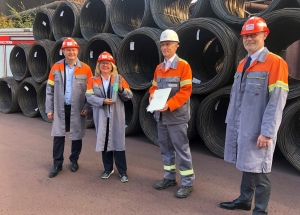


(Posted on 13/09/21)
During a visit to ArcelorMittal Germany’s steel plant in Hamburg, Federal Environment Minister Svenja Schulze pledged the Federal Government’s support for the construction of Germany’s first industrial scale hydrogen-based direct reduced iron (DRI) plant.
This demonstrator plant, which will use hydrogen exclusively as the chemical agent to reduce iron ore into DRI, is intended to lay the foundation for a steelmaking process that means steel can be produced with zero carbon-emissions[1>, using electric arc furnaces fed with hydrogen reduced DRI and scrap metal, powered by renewable electricity.
The Federal Government has expressed its intention to provide €55 million of funding support towards the construction of the plant, which is half of the €110 million total capital expenditure required. The next step is for the European Commission to approve the Federal Government's intention to provide funding before the installation of the new plant can begin. Production is scheduled to start in 2025.
DRI is currently produced using natural gas to reduce iron ore. In a transition phase, the process of reducing iron ore with hydrogen will first be demonstrated using hydrogen generated by the separation of waste gas from the Hamburg plant. Once available in sufficient volumes and at an affordable price, green hydrogen - made from the electrolysis of water using renewable energy - will be used. By 2030, ArcelorMittal plans to produce more than one million tonnes of zero carbon-emissions steel a year in the Hamburg plant alone, thereby saving around 800,000 tonnes of CO2 emissions annually.
The plant is an important component of ArcelorMittal Germany’s Steel4Future strategy, which involves the conversion of its four German plants - in Hamburg, Bremen, Duisburg and Eisenhüttenstadt - to zero carbon-emissions steel production in the coming years.
Commenting, Dr. Uwe Braun, CEO ArcelorMittal Hamburg, said: “With the intended plant, for the first time we will be able to produce 100,000 tonnes of DRI for steel production using hydrogen - as early as 2025. Our project thus contributes to the goal of greenhouse gas reduction and a low-carbon economy. The technology is also directly transferrable and shows how other steelworks in our group – like Bremen and Eisenhüttenstadt - can convert to zero carbon-emissions steel production processes. But one thing is clear - the production of low or zero carbon-emissions steel is significantly more expensive than traditional steelmaking methods. When it comes to these challenges, we continue to rely on political support to create the appropriate framework conditions. The German Government's intention to provide funding helps our project and we are very grateful for this. Now we need approval from the European Commission so that words can be followed up with action.”
The National Grain and Feed Association (NGFA) has applauded Senator Deb. Fischer’s (R-Neb.) reintroduction... Read more
Anglo American plc and Teck Resources Limited have received regulatory approval from the Government... Read more
The Rhodes Ridge Joint Venture has approved a $191 million (A$294 million) (Rio Tinto share $96 million... Read more
Trafigura Group Pte Ltd, a global leader in the commodities industry, has announced its financial results... Read more
Rio Tinto has successfully produced the first copper from the Johnson Camp mine in Arizona using its... Read more
The American Soybean Association’s World Initiative for Soy in Human Health programme and the... Read more
Karlka Nyiyaparli Aboriginal Corporation (KNAC) Registered Native Title Body Corporate and Rio Tinto... Read more
OCI Global, a leading global producer and distributor of nitrogen products has announced that it has... Read more
In December 2024, SSAB was granted a permit by the Land and Environment Court at Umeå District... Read more
The President of the Republic of Guinea has joined project partners WCS1, Baowu, Chinalco and Rio Tinto... Read more